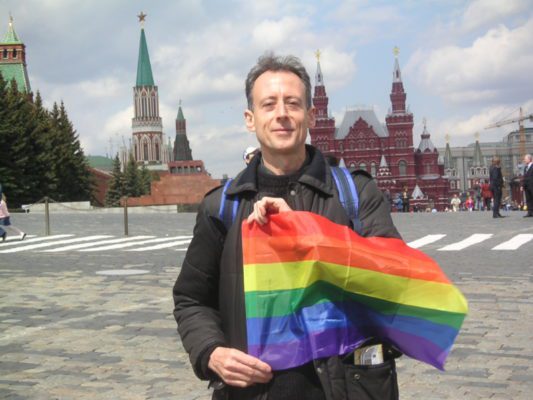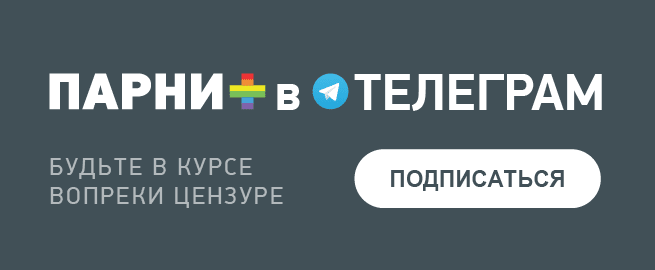Аfter the Gosduma passed a law on the complete ban on the so-called gay propaganda, we decided to talk with an outstanding fighter for the rights of LGBTQ+ people around the world, Peter Tatchell. He not only advocated for community rights, but also took radical action. Tatchel became the organiser of the OutRage! and took an active part in the fight for the repeal of Section 28.
Peter took part in Moscow gay pride more than once in 2006 and 2007. Despite the fact that in 2007 he suffered a head injury and arrest, he was not afraid and came again in 2009 to Moscow. In 1999, Peter, along with his associates, attempted to make a civilian arrest of former Zimbabwean dictator Robert Mugabe during his visit to London, for crimes against homosexuals in his country.
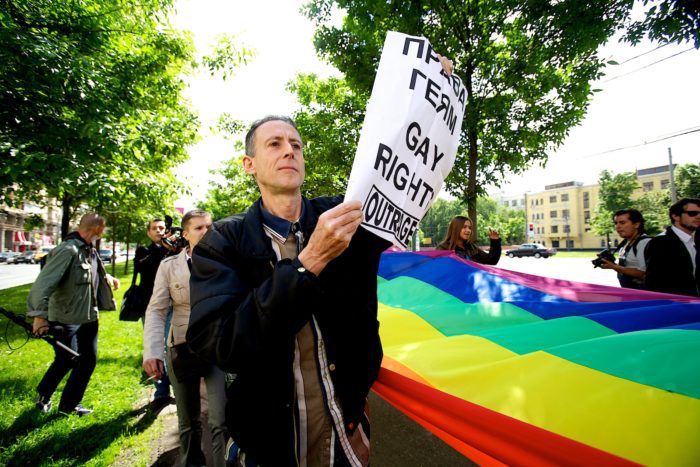
Q: You have been active for a long time in the protection of human rights, the environment and democracy, global justice, as well as LGBTQ+ freedom. Could you please tell our readers why these things are important for you and what you do to protect those principles?
PT: I love other people and I love freedom, justice and equality. I would not want to suffer, so I feel a duty to support others who are battling to prevent suffering, whether against fellow human beings or against other sentient animal species. I’m inspired by the non-violent direct action methods of Mohondas Gandhi and Martin Luther King. I have sought to apply their methods to my struggles for LGBTQ+ and other human rights. As well as protest, I also lobby and negotiate with state institutions and non-governmental bodies like churches, businesses and media – and collaborate with other campaigners to support their efforts.
Q: You participated in Moscow prides, and you were even attacked by homophobes. Could you please tell what links you to Russia and what was your experience there?
PT: The struggle for LGBTQ+ rights is global. It transcends all borders. We must stand together in solidarity, especially with LGBTQ+ groups subject to state repression. I was asked by Russian LGBTQ+ activists to go to Moscow to support their efforts to hold a Pride parade and to bring international news media. I went five times, beginning in 2006 on the occasion of the first attempt to hold Moscow Pride. On each occasion, the Pride march was brutally suppressed by the Omon riot squad, far right extremists and Russian Orthodox fanatics. We were beaten and arrested. It was terrifying. In 2007, on Terverskya, I was almost beaten unconscious by neo-Nazis. As I was losing consciousness, the police intervened to arrest me, while they allowed my attackers to walk free. The Russian LGBTQ+ activists received similar assaults and arrests.
Q: After the collapse of the Soviet Union and the abolition of the law on homosexuality in 1994, people in Russia had hope for freedom and democracy. As we can see now, after 30 years, laws on gay propaganda among underage are being passed through the parlament and now a law is being prepared to completely ban LGBTQ+ comunity in general. In your opinion, what went wrong in Russia and why is Russian society being plunged back into the “Dark Middle Ages”?
PT: There has been a stealth coup by former KGB secret police officers like Vladimir Putin. They have captured the state. They are chauvinist nationalists who want to restore Russia’s Great Power status that existed in Tsarist times and during the era of the Soviet Union. Their regime has many of the hallmarks of a fascist state at home and of an imperialist superpower abroad. President Putin and his cronies are demonising LGBTQ+s as the enemy within, like Hitler scapegoated Jewish people. They are using homophobia as a political weapon to distract the Russian people from the economic failings and corruption of the Kremlin regime.
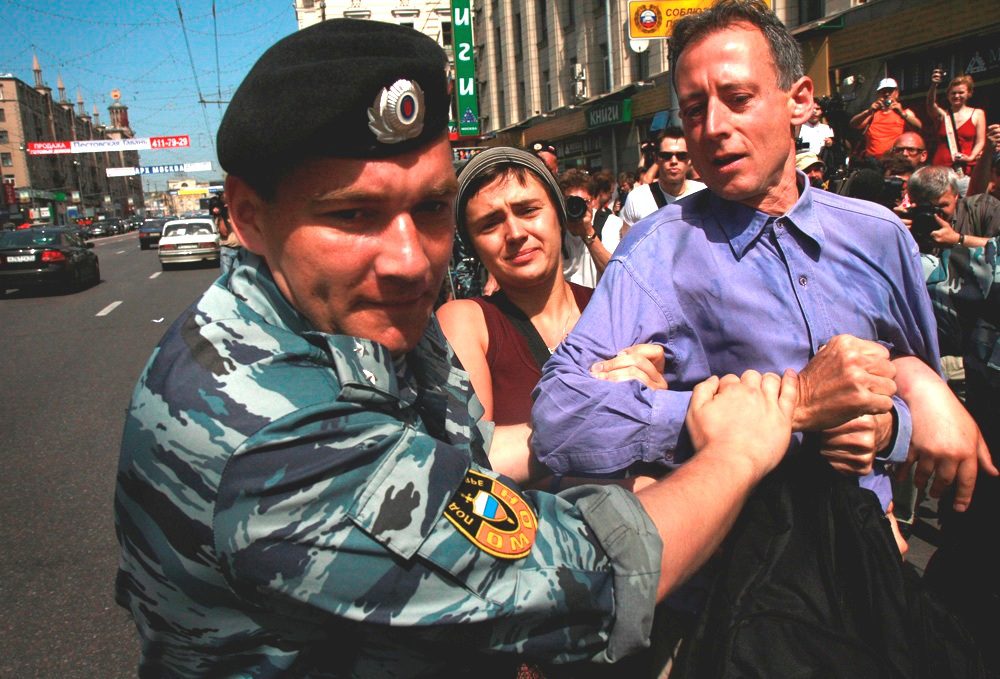
Q: Back in the 90s in London, the police pursued gays and ambushed them, what happened in society, that the situation changed radically?
PT: Negotiations with the police in the 1980s to end their homophobia did not work. The raids and harassment continued unabated. So the queer rights direct action group OutRage! began a high profile campaign of non-violent direct action and civil disobedience in 1990. We invaded police stations, exposed undercover police and interrupted police press conferences. We told the personal stories of same-sex couples who had been arrested for mere kissing and cuddling. We said: why are police wasting resources on harassing LGBTQ+s for consenting victimless behaviour when they claim they don’t have enough officers and funding to tackle robberies, assaults, house break-ins and car thefts? We won the battle for public opinion and this forced the police to make concessions. Within a year, they agreed to most of our demands for a non-homophobic policing policy. Within three years, the number of men convicted for consensual behaviour fell by two-thirds – the biggest, fastest fall ever. This saved thousands of gay and bi men from arrest, conviction, fines and jail.
Q: For the LGBTQ+ community, and for democracy in Russia, now are not the best of times. From your point of view, how should Russian society fight for its rights, knowing about the massive repressions against activists?
PT: Russian activists are best placed to decide the methods to fight for LGBTQ+ rights. But I have long suggested a number of methods for consideration. First, out hypocritical homophobic politicians and church leaders who are harming the LGBTQ+ community. Second, promote awareness that homosexuality has been found in all known animal species – proving that it is part of nature. Third, popularise the homosexuality / bisexuality of famous Russians such as Tchaikovsky, Eisenstein, Tolstoy, Diaghilev, Nureyev, Erte, Gogol and Nijinsky. Fourth, expand foreign-based Russian LGBTQ+ social media output to circumvent state censorship and reduce the risk to activists. Fifth, build alliances with other Russian civil society and human rights organisations, to support each other – unity and solidarity is strength.
Q: Unfortunately, Putin and his followers unleashed a terrible war in Ukraine. Many countries blame not only the leadership of the country, but also all citizens. How do you feel about collective responsibility?
PT: Responsibility for the war in Ukraine rests squarely with the Russian political and military leadership – not with the Russian people collectively. Sanctions against the leaders and their families must be expanded and strengthened. International arrest warrants should be issued against these leaders and prosecutions for war crimes and crimes against humanity commenced. Total economic war must be waged against Russia to force its withdrawal from Ukraine, similar to the economic campaign against apartheid South Africa.
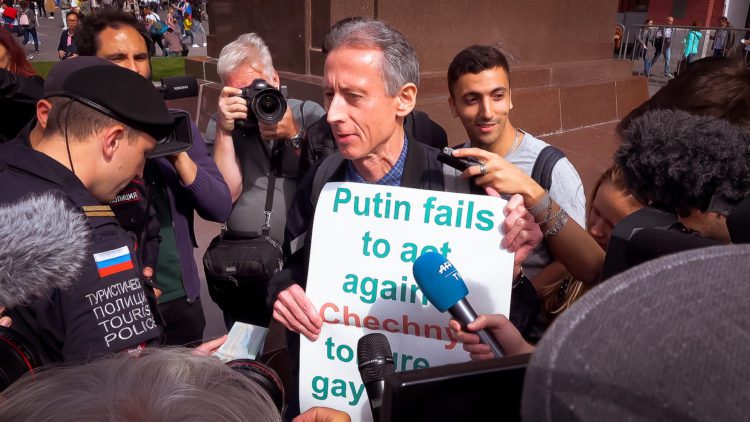
Q: Is it possible now to talk about those LGBTQ+ activists who remain in Russia and need help, or is there a war going on, is it not ethical?
PT: Despite the Ukraine war, we must continue to show solidarity with Russian LGBTQ+ activists and civil society and human rights defenders – and anti-war campaigners. They are not to blame for the war. They are the best hope to challenge and reverse Putin’s tyranny and militarism.
Q: In addition, to the difficult situation in Russia, the LGBTQ+ community in Belarus also turned out to be under repression. How important is it to speak not only about Russia, but also about other countries where democratic values have been undermined?
PT: it is hugely important that in focussing on Russia we do not forget the parallel repression in Belarus and other despotic regimes. We must stand with all oppressed people everywhere.
Q: Due to the war and persecution, people from Russia, Belarus and Ukraine are fleeing their countries and seeking asylum in Europe and in particular in the United Kingdom. In your opinion, how important is it to help such people and maybe if you are involved in what you do in particular for such people?
PT: It is best if people stay and fight but I understand why many need to flee, to escape war and prison. I fled Australia in 1971 because I would have faced two year’s jail over my refusal to register for the draft to fight in Vietnam. It is vital that western countries give Russian activists a safe haven and that they continue the struggle from the country where they have been given refuge.
Q: Among migrants in Europe, conflicts often arise because of the war. For example, at London Pride 2022, the Russian-speaking community QueerDom came out in support with Ukrainian flags. In turn, the Ukrainian community in London accused QueerDom of desecrating Ukrainian symbols. What do you think could help avoid such conflicts and misunderstandings?
PT: I am not aware of that dispute but if Russians marched with Ukraine flags in solidarity against the war, that is admirable. I do not understand how anyone could criticise that.
Q: Fighting for your human rights is not always easy. So can you wish for the people who remain in Russia, Belarus and Ukraine and continue to defend their independence, democracy, and the right to be who they are?
PT: Wherever possible, activists should remain and fight to change repressive homophobic regimes. If everyone goes abroad, that will weaken the resistance and benefit the tyrants.
Peter Tatchell is a unique figure in the LGBTQ+ world. He is not just fighting homophobia, but also made a huge contribution to the defense of democracy, human rights around the world. His eccentric personality caught the attention of filmmakers, and in 2020 Netflix released a documentary about Peter, ‘Hating Peter Tatchell’, which tells the story from his youth to his fight for justice amid controversy and political turmoil.
Dmitry Sudnik

